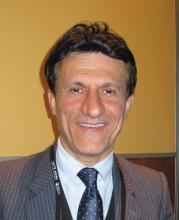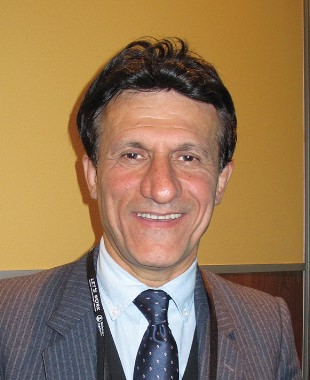User login
SYDNEY – Age should not be a barrier to chemotherapy for lung cancer, even in patients over age 70, based on the results of a retrospective study.
Nearly one-third (32.2%) of 659 patients over age 70 with non–small cell lung cancer received no radiotherapy or chemotherapy, according to data from patients who presented at a single center between 2003 and 2006.
Around one-quarter of the cohort received chemotherapy, 13.9% received surgery, but 10% received second-line chemotherapy, according to data presented at a world conference on lung cancer.
Median survival was 231 days for patients aged 70-75 years, 250 days for those aged 76-80 years, and 213 days for those aged over 80 years.
Median survival was 610 days among patients given second-line chemotherapy, compared with 285 days for those who received only first-line chemotherapy.
Dr. Hirsh Koyi said he and his fellow researchers were surprised to discover how many patients over 70 did not receive any treatment at all. He and his colleagues have been taking steps to address this in their own practice.
There were generally concerns that patients over 70 were more prone to other diseases such as kidney or heart disease. However, the patient population was generally healthy and in good shape, which raised questions about why they did not receive the same treatment as younger patients, said Dr. Koyi, of Gävle (Sweden) Hospital.
Older patients "are undertreated and discriminated against without any reason. We have patients who are older than 80 years and, with surgery, are living still after 10 years," Dr. Koyi said in an interview. No prospective studies specifically address chemotherapy in this age group, he pointed out.
Dr. Koyi said performance status (PS) was a more important consideration in deciding treatment for older patients with lung cancer, with the study finding that median survival for patients with a PS score of 0 was 810 days and was 109 days for those with a PS score of 3.
"If they have a good performance status, age is no problem," Dr. Koyi said. "We have patients who are 50 years old, lying in bed, very sick, with no chemotherapy, but other patients who are 70-80 years have a good performance status and get chemotherapy."
He said patients over 70 years with a PS score of 1-2, with good kidney and heart function, and in otherwise good health, should be considered for chemotherapy.
"We have to encourage our colleagues to look not at the age but at how each patient feels."
The conference was sponsored by the International Association for the Study of Lung Cancer. There were no relevant conflicts of interest declared.
SYDNEY – Age should not be a barrier to chemotherapy for lung cancer, even in patients over age 70, based on the results of a retrospective study.
Nearly one-third (32.2%) of 659 patients over age 70 with non–small cell lung cancer received no radiotherapy or chemotherapy, according to data from patients who presented at a single center between 2003 and 2006.
Around one-quarter of the cohort received chemotherapy, 13.9% received surgery, but 10% received second-line chemotherapy, according to data presented at a world conference on lung cancer.
Median survival was 231 days for patients aged 70-75 years, 250 days for those aged 76-80 years, and 213 days for those aged over 80 years.
Median survival was 610 days among patients given second-line chemotherapy, compared with 285 days for those who received only first-line chemotherapy.
Dr. Hirsh Koyi said he and his fellow researchers were surprised to discover how many patients over 70 did not receive any treatment at all. He and his colleagues have been taking steps to address this in their own practice.
There were generally concerns that patients over 70 were more prone to other diseases such as kidney or heart disease. However, the patient population was generally healthy and in good shape, which raised questions about why they did not receive the same treatment as younger patients, said Dr. Koyi, of Gävle (Sweden) Hospital.
Older patients "are undertreated and discriminated against without any reason. We have patients who are older than 80 years and, with surgery, are living still after 10 years," Dr. Koyi said in an interview. No prospective studies specifically address chemotherapy in this age group, he pointed out.
Dr. Koyi said performance status (PS) was a more important consideration in deciding treatment for older patients with lung cancer, with the study finding that median survival for patients with a PS score of 0 was 810 days and was 109 days for those with a PS score of 3.
"If they have a good performance status, age is no problem," Dr. Koyi said. "We have patients who are 50 years old, lying in bed, very sick, with no chemotherapy, but other patients who are 70-80 years have a good performance status and get chemotherapy."
He said patients over 70 years with a PS score of 1-2, with good kidney and heart function, and in otherwise good health, should be considered for chemotherapy.
"We have to encourage our colleagues to look not at the age but at how each patient feels."
The conference was sponsored by the International Association for the Study of Lung Cancer. There were no relevant conflicts of interest declared.
SYDNEY – Age should not be a barrier to chemotherapy for lung cancer, even in patients over age 70, based on the results of a retrospective study.
Nearly one-third (32.2%) of 659 patients over age 70 with non–small cell lung cancer received no radiotherapy or chemotherapy, according to data from patients who presented at a single center between 2003 and 2006.
Around one-quarter of the cohort received chemotherapy, 13.9% received surgery, but 10% received second-line chemotherapy, according to data presented at a world conference on lung cancer.
Median survival was 231 days for patients aged 70-75 years, 250 days for those aged 76-80 years, and 213 days for those aged over 80 years.
Median survival was 610 days among patients given second-line chemotherapy, compared with 285 days for those who received only first-line chemotherapy.
Dr. Hirsh Koyi said he and his fellow researchers were surprised to discover how many patients over 70 did not receive any treatment at all. He and his colleagues have been taking steps to address this in their own practice.
There were generally concerns that patients over 70 were more prone to other diseases such as kidney or heart disease. However, the patient population was generally healthy and in good shape, which raised questions about why they did not receive the same treatment as younger patients, said Dr. Koyi, of Gävle (Sweden) Hospital.
Older patients "are undertreated and discriminated against without any reason. We have patients who are older than 80 years and, with surgery, are living still after 10 years," Dr. Koyi said in an interview. No prospective studies specifically address chemotherapy in this age group, he pointed out.
Dr. Koyi said performance status (PS) was a more important consideration in deciding treatment for older patients with lung cancer, with the study finding that median survival for patients with a PS score of 0 was 810 days and was 109 days for those with a PS score of 3.
"If they have a good performance status, age is no problem," Dr. Koyi said. "We have patients who are 50 years old, lying in bed, very sick, with no chemotherapy, but other patients who are 70-80 years have a good performance status and get chemotherapy."
He said patients over 70 years with a PS score of 1-2, with good kidney and heart function, and in otherwise good health, should be considered for chemotherapy.
"We have to encourage our colleagues to look not at the age but at how each patient feels."
The conference was sponsored by the International Association for the Study of Lung Cancer. There were no relevant conflicts of interest declared.
AT THE IASLC WORLD CONFERENCE
Major finding: Nearly one-third (32.2%) of 659 patients over age 70 with non–small cell lung cancer received no radiotherapy or chemotherapy.
Data source: Retrospective study of data from patients who presented at a single center between 2003 and 2006.
Disclosures: The conference was sponsored by the International Association for the Study of Lung Cancer. There were no relevant conflicts of interest declared.

